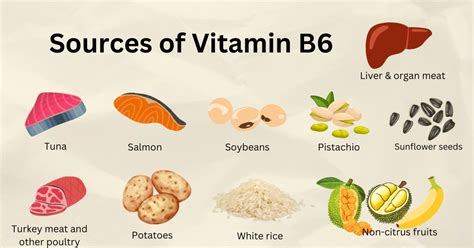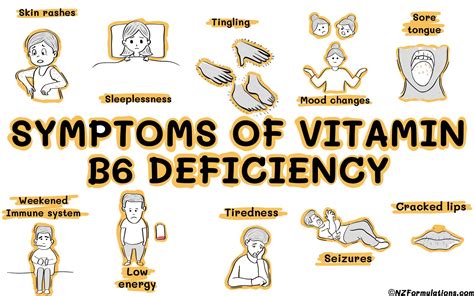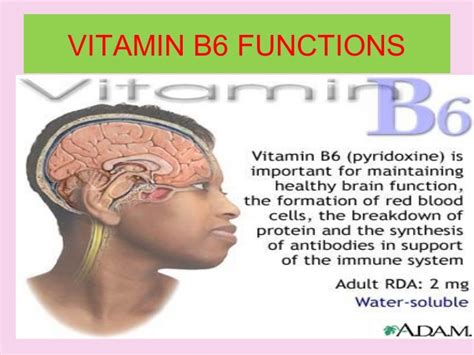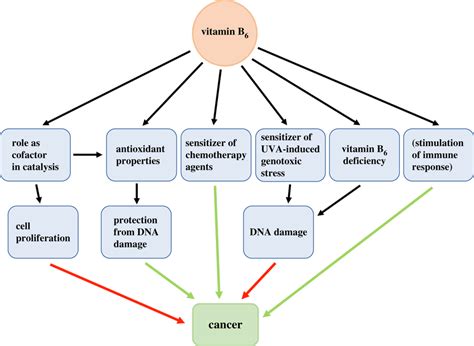Intro
Unlock the Vitamin B6 name revealed, also known as Pyridoxine, and discover its benefits, functions, and food sources, including pyridoxal and pyridoxamine, for overall health and wellness.
Vitamins are essential nutrients that play a crucial role in maintaining our overall health and wellbeing. Among the various vitamins, Vitamin B6 is one of the most versatile and widely recognized. It is a water-soluble vitamin that is part of the B complex group, which includes several other essential nutrients like thiamine, riboflavin, and folate. Vitamin B6, also known as pyridoxine, is involved in numerous bodily functions, including energy production, nerve function, and immune system function. In this article, we will delve into the world of Vitamin B6, exploring its benefits, food sources, and potential health effects.
The importance of Vitamin B6 cannot be overstated. It is involved in over 100 biochemical reactions in the body, making it a vital nutrient for maintaining optimal health. From regulating blood sugar levels to supporting brain function, Vitamin B6 plays a multifaceted role in our bodily functions. Additionally, Vitamin B6 has been linked to various health benefits, including reducing the risk of heart disease, certain cancers, and cognitive decline. With its widespread involvement in our bodily functions, it is essential to understand the role of Vitamin B6 and how we can incorporate it into our diet.
Vitamin B6 is found in a variety of food sources, including meat, fish, poultry, whole grains, and legumes. Some of the richest sources of Vitamin B6 include chicken, turkey, tuna, salmon, and sweet potatoes. It is also available in supplement form, which can be beneficial for individuals who are deficient or have a restricted diet. However, it is essential to note that excessive intake of Vitamin B6 can lead to adverse effects, such as nerve damage and neurological problems. Therefore, it is crucial to maintain a balanced diet and consult with a healthcare professional before taking any supplements.
Vitamin B6 Benefits

Food Sources of Vitamin B6
Vitamin B6 is found in a variety of food sources, including: * Meat: chicken, turkey, beef, and pork * Fish and seafood: tuna, salmon, and shrimp * Whole grains: brown rice, quinoa, and whole wheat bread * Legumes: chickpeas, black beans, and lentils * Vegetables: sweet potatoes, carrots, and green beans * Nuts and seeds: sunflower seeds, pumpkin seeds, and almondsVitamin B6 Deficiency

Vitamin B6 and Heart Health
Vitamin B6 plays a crucial role in maintaining heart health by lowering homocysteine levels in the blood. Elevated homocysteine levels have been linked to an increased risk of heart disease, including coronary artery disease and stroke. Vitamin B6, along with other B vitamins, helps to convert homocysteine into other amino acids, reducing the risk of heart disease.Vitamin B6 and Brain Function

Vitamin B6 and Immune System Function
Vitamin B6 is essential for maintaining a healthy immune system. It helps to produce white blood cells, which fight off infections and diseases. A deficiency in Vitamin B6 can lead to impaired immune system function, making individuals more susceptible to illnesses.Vitamin B6 Supplements

Vitamin B6 Interactions
Vitamin B6 can interact with various medications, including: * Blood thinners: Vitamin B6 can increase the risk of bleeding when taken with blood thinners. * Diabetes medications: Vitamin B6 can affect blood sugar levels, making it essential to monitor glucose levels when taking diabetes medications. * Antidepressants: Vitamin B6 can interact with certain antidepressants, such as selective serotonin reuptake inhibitors (SSRIs).Vitamin B6 and Pregnancy

Vitamin B6 and Breastfeeding
Vitamin B6 is also essential for breastfeeding women, as it helps to produce milk and support infant development. A deficiency in Vitamin B6 during breastfeeding can lead to various health problems, including impaired milk production and infant developmental delays.Vitamin B6 and Cancer

Vitamin B6 and Cognitive Function
Vitamin B6 is involved in the production of neurotransmitters, such as serotonin and dopamine, which play a crucial role in regulating mood and cognitive function. A deficiency in Vitamin B6 has been linked to various neurological disorders, including depression, anxiety, and cognitive decline.What are the symptoms of Vitamin B6 deficiency?
+The symptoms of Vitamin B6 deficiency include fatigue, weakness, skin problems, hair loss, and mood changes.
What are the richest sources of Vitamin B6?
+The richest sources of Vitamin B6 include chicken, turkey, tuna, salmon, and sweet potatoes.
Can Vitamin B6 supplements interact with medications?
+Yes, Vitamin B6 supplements can interact with various medications, including blood thinners, diabetes medications, and antidepressants.
In conclusion, Vitamin B6 is a vital nutrient that plays a multifaceted role in our bodily functions. From regulating blood sugar levels to supporting brain function, Vitamin B6 is essential for maintaining optimal health. By incorporating Vitamin B6-rich foods into our diet and being aware of potential interactions with medications, we can reap the numerous health benefits of this essential nutrient. We invite you to share your thoughts and experiences with Vitamin B6 in the comments section below. Additionally, if you found this article informative, please share it with your friends and family to help spread awareness about the importance of Vitamin B6.
